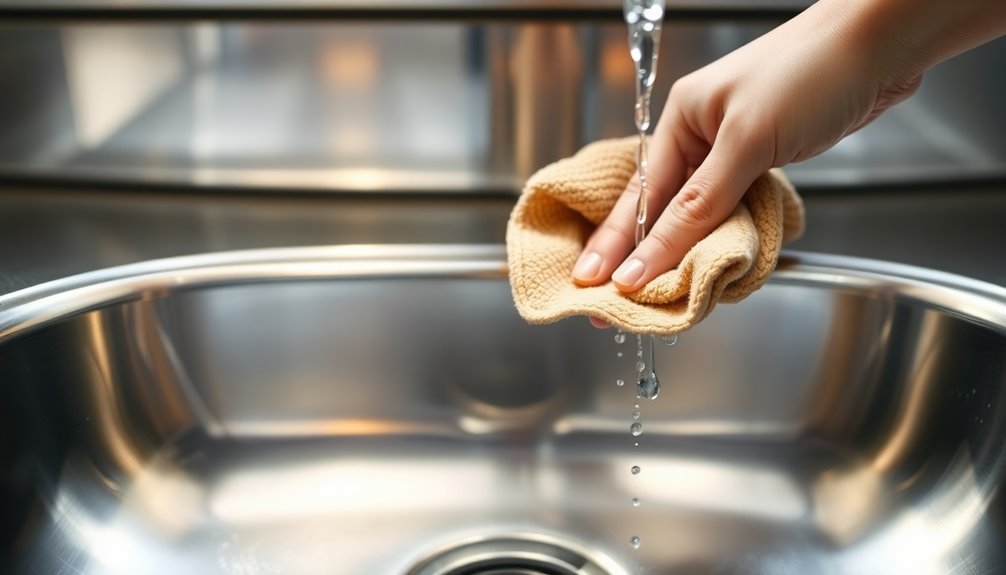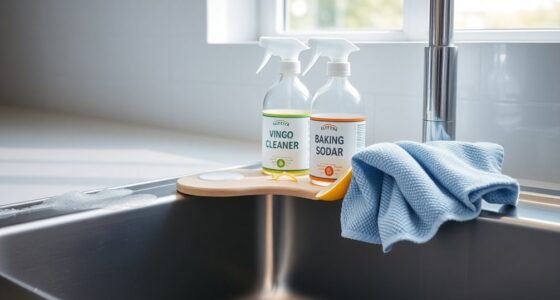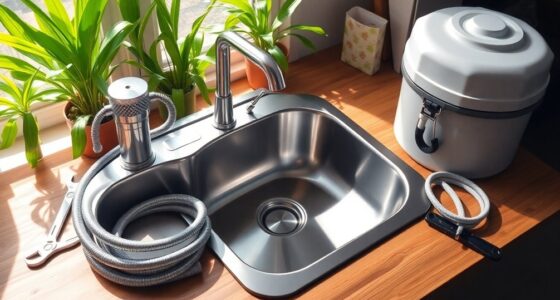To clean hard water stains from your stainless steel sink, mix equal parts white vinegar and water in a spray bottle. Spray it on the stained areas and let it sit for 5-10 minutes before scrubbing gently with a microfiber cloth. Rinse thoroughly and dry with another cloth to prevent new spots. Alternatively, sprinkle baking soda on a damp sink, add a bit of water or dish soap, and scrub following the grain. There are more tips for success you won't want to miss.
Key Takeaways
- Mix equal parts white vinegar and water in a spray bottle, apply, and let sit for 5-10 minutes before scrubbing.
- Sprinkle baking soda on a damp sink, add water to form a paste, and gently scrub along the grain of the stainless steel.
- Rinse the sink thoroughly with clean water after using vinegar or baking soda to remove any residue.
- Dry the sink immediately with a microfiber cloth to prevent new hard water stains from forming.
- Consider installing a water softener or using mineral oil weekly to minimize hard water issues and protect the sink.
Why Hard Water Stains Form on Stainless Steel
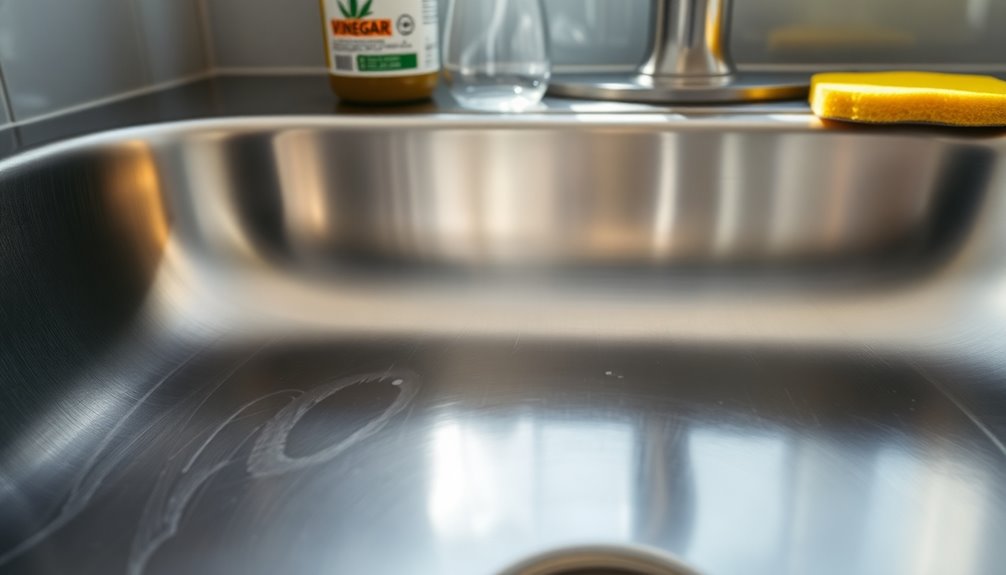
When you use hard water, you mightn't realize that it's leaving behind mineral deposits on your stainless steel sink.
These deposits, primarily calcium and magnesium, form hard water spots as water evaporates. As the water dries, it creates unsightly stains on stainless steel surfaces, resulting in white cloudy spots and streaks that diminish the aesthetic appeal of your sink.
If you don't clean these stains promptly, the mineral deposits can accumulate and become harder to remove over time.
While hard water stains won't affect your sink's functionality, neglecting them can lead to rust and oxidation from the minerals.
Addressing these stains quickly helps maintain your sink's appearance and prevents costly repairs down the road.
Materials Needed
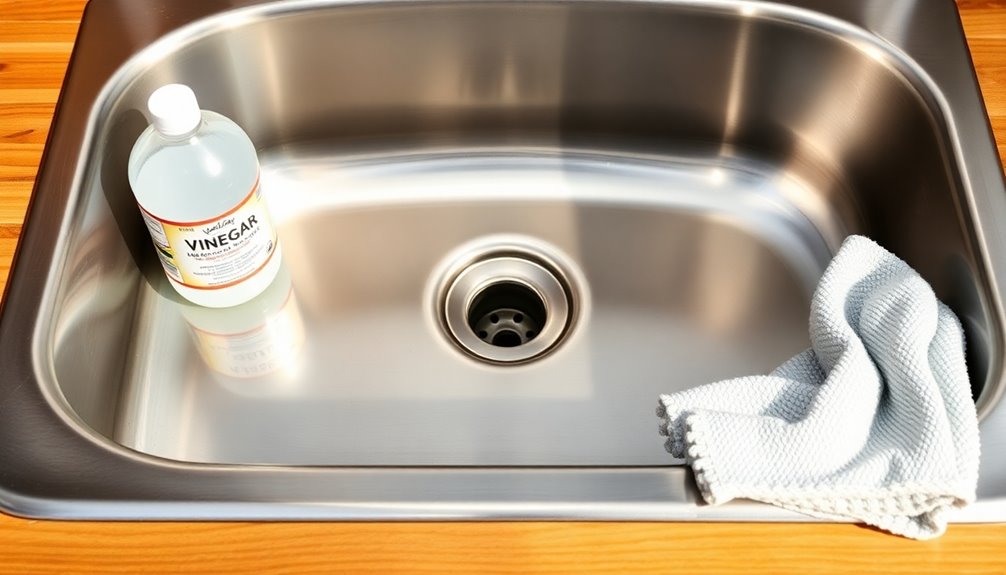
To tackle those hard water stains on your stainless steel sink effectively, you'll need a few key materials.
Start with white vinegar, a natural acidic cleaner that dissolves mineral deposits.
Next, grab baking soda, which acts as a gentle abrasive to scrub stubborn stains without scratching your sink.
Lemon juice is another great option, as its acidity breaks down hard water stains while leaving a fresh scent.
Don't forget club soda, which you can pour directly onto stains for an extra cleaning boost due to its carbonation.
Finally, a few microfiber cloths are essential for wiping and drying your sink, helping to prevent scratches and minimize new stain formation.
With these materials, you'll be ready to clean your stainless steel sink!
Remove Hard Water Stains on Stainless Steel Using Vinegar
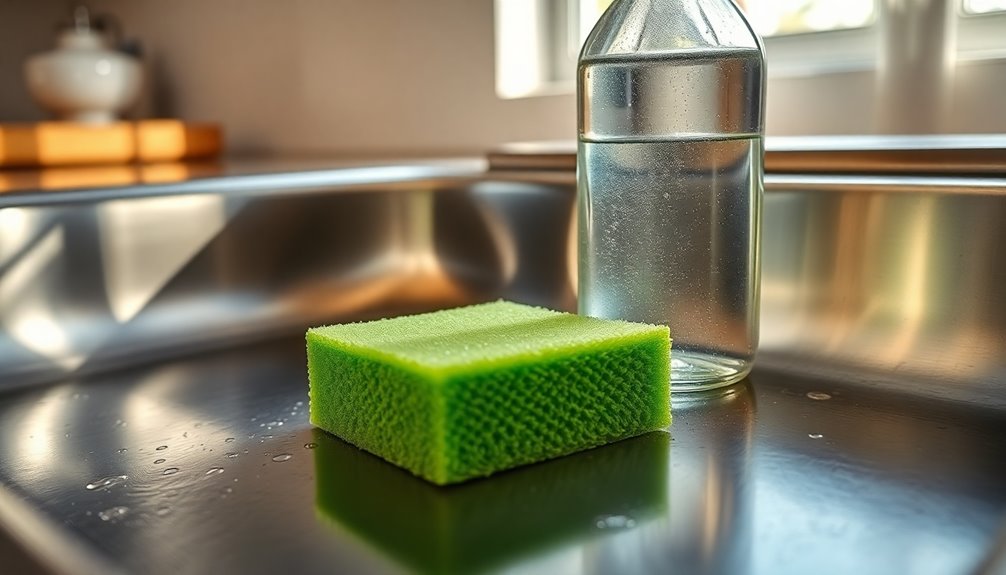
If you're looking to eliminate hard water stains from your stainless steel sink, using a vinegar solution is an effective approach.
To create the solution, mix equal parts white vinegar and water in a spray bottle. Spray it directly onto the stained areas and let it sit for 5-10 minutes to break down mineral deposits.
After that, gently scrub the surface with a microfiber cloth or sponge to remove hard water stains. Once you've scrubbed, rinse the sink thoroughly with clean water to remove any vinegar residue that could cause further staining.
Finally, wipe the sink dry with a clean microfiber cloth to prevent new spots from forming. For best results, consider using distilled white vinegar.
Remove Hard Water Stains on Stainless Steel Using Baking Soda
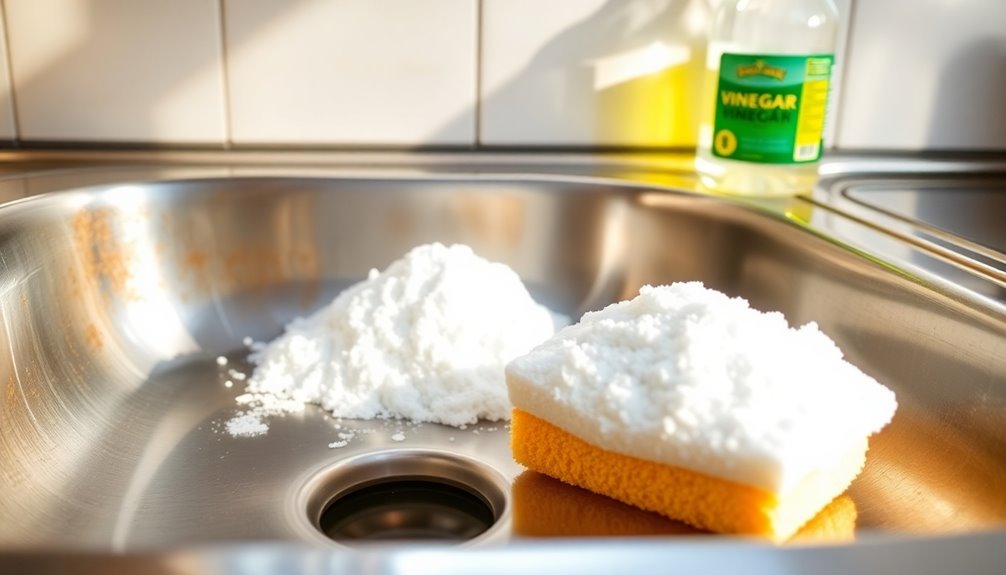
Using baking soda is a simple yet effective way to tackle hard water stains on your stainless steel sink.
Start by sprinkling a generous amount of baking soda directly onto the damp surface. Drizzle a small amount of water or dish soap over the baking soda to create a paste that lifts the stains.
Gently scrub the stained areas with your fingertips or a soft cloth, making sure to follow the grain of the stainless steel to avoid scratches.
After you scrub, rinse the sink thoroughly with warm water to remove any residue from the baking soda and soap mixture.
Finally, dry the sink with a clean microfiber cloth to prevent new hard water stains from forming.
How to Prevent Hard Water Stains on Stainless Steel
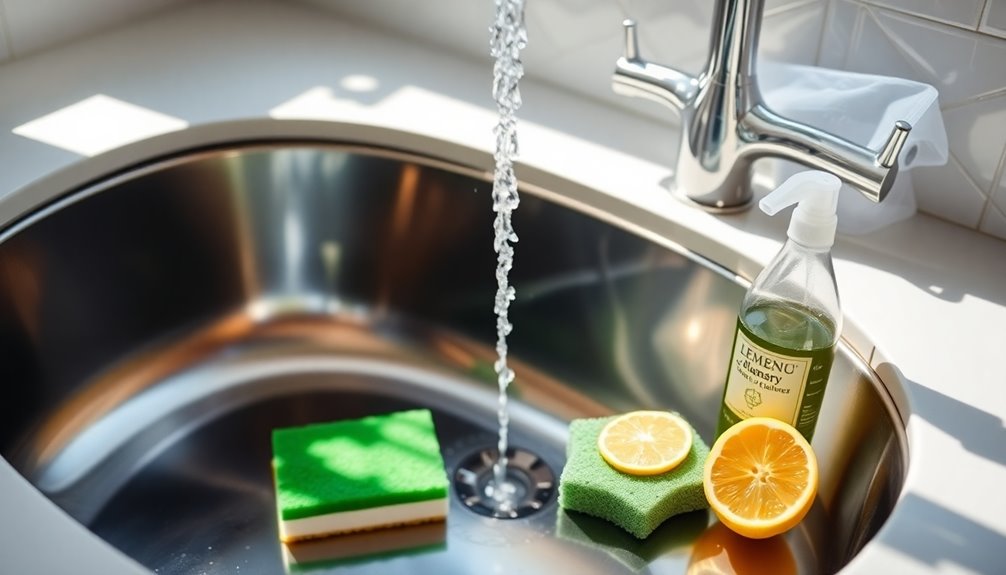
Although hard water stains can be a nuisance, you can easily prevent them from forming on your stainless steel sink with a few simple habits. Regular maintenance is key. Here are some tips to help you keep your sink spotless:
| Action | Benefits |
|---|---|
| Dry Sink After Use | Reduces mineral buildup from evaporated water |
| Install Water Softener | Mitigates hard water issues at the source |
| Use Mineral Oil Weekly | Creates a protective barrier against stains |
| Clean with Vinegar & Baking Soda | Removes existing stains and prevents buildup |
Consistent maintenance, similar to air purifier maintenance, ensures long-lasting cleanliness and prevents the buildup of hard water stains.
Frequently Asked Questions
How to Get Hard Water Spots off a Stainless Steel Sink?
To get hard water spots off your stainless steel sink, start by mixing equal parts white vinegar and water in a spray bottle.
Spray it on the stains and let it sit for 5-10 minutes. Then, scrub with a microfiber cloth.
Alternatively, you can use lemon juice or a baking soda paste.
Regularly drying your sink after use can help prevent these stubborn spots from forming in the first place.
How Do You Remove Limescale From a Stainless Steel Sink?
Did you know that nearly 85% of U.S. households face hard water issues?
To remove limescale from your stainless steel sink, mix equal parts white vinegar and water in a spray bottle. Spray it on the stained areas and let it sit for 5-10 minutes.
For tougher stains, sprinkle baking soda first, then spray vinegar for a foaming reaction. After scrubbing, rinse thoroughly with warm water to keep your sink shining.
How Do You Remove Calcium Deposits From a Stainless Steel Sink?
To remove calcium deposits from your stainless steel sink, mix equal parts white vinegar and water in a spray bottle.
Spray the solution onto the affected areas and let it sit for 5-10 minutes. Then, scrub gently with a microfiber cloth.
For tougher deposits, make a paste of baking soda and water, apply it, then spray with vinegar for a foaming action.
Regular maintenance, like drying your sink, helps prevent future buildup.
How Do You Remove Hard Stains From Stainless Steel?
To remove hard stains from stainless steel, you've got a few effective options.
First, mix equal parts of white vinegar and water, spray it on the stains, and let it sit for 5-10 minutes. Then, scrub gently with a microfiber cloth.
If that doesn't work, try rubbing a cut lemon on the stains or a paste of baking soda and water.
Regular maintenance will keep your stainless steel looking great!
Conclusion
In the end, keeping your stainless steel sink sparkling isn't as intimidating as it seems. With a little vinegar and baking soda magic, you can wave goodbye to those pesky hard water stains. Just remember to give your sink some TLC regularly, and it'll shine like new. By turning the tide on hard water buildup, you'll enjoy a gleaming sink that's always ready to impress. So go ahead, embrace the shine and let your sink dazzle!
